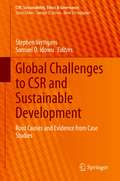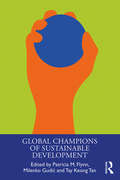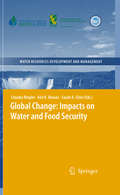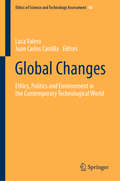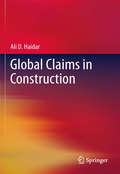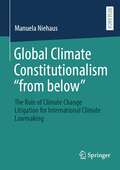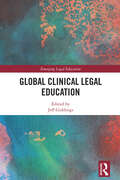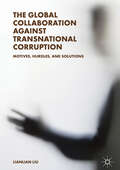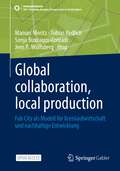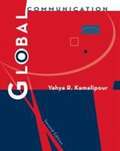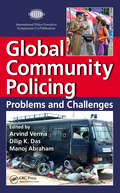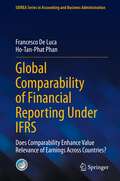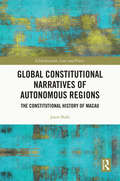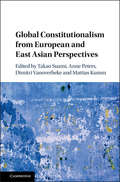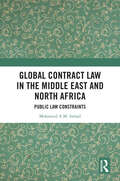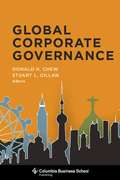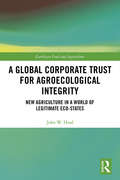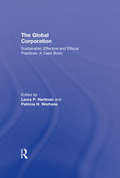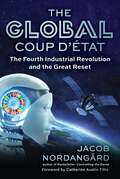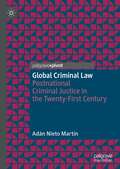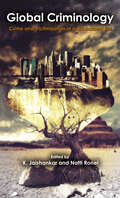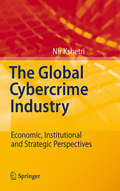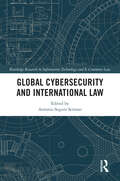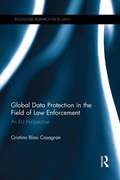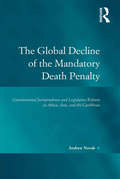- Table View
- List View
Global Challenges to CSR and Sustainable Development: Root Causes and Evidence from Case Studies (CSR, Sustainability, Ethics & Governance)
by Stephen Vertigans Samuel O. IdowuThis book examines and analyzes the challenges programmes for Corporate Social Responsibility (CSR) and sustainable development are facing in global management practice. It looks at the dichotomy of a general and popular demand for responsible and resilient management, and the counterplayers that impact the positive effect of such efforts. The book assembles latest research looking at the root causes for this opposition, and new case studies that showcase the dilemma and possible solutions to overcome it. Overall, the book juxtaposes short terminism within CSR programmes and longer term sustainable development, mis-allocation of resources and failed promises associated with CSR, and sketches pathways how CSR and sustainable development can be directed towards the most pressing issues.
Global Champions of Sustainable Development (The Principles for Responsible Management Education Series)
by Patricia M. Flynn Tay Keong Tan Milenko GudićThe 17 Sustainable Development Goals (SDGs) embody the collective aspirations of the world’s peoples: peace, freedom, development and sustainability. The challenges associated with the struggle for attainment of these goals and objectives are as diverse and complex as the variety of human societies, national conditions and natural ecosystems worldwide. The problems to be addressed range from extreme poverty and pandemics to racism and refugee crises. Some of the best strategies and solutions to these problems emerged from unlikely places, ranging from the corporate boardrooms and halls of administration to the fields of civic engagement and the vortices of crises. Often, a single person is the dauntless driving force behind these innovative programs and courageous experiments that made all the difference to the poorest and most disadvantaged social groups. Somehow, they were able to turn the abstract goals and principles of sustainability into concrete programs and effective action. This book, the first of its kind, offers a platform that shares the individual experiences and personal studies of champions around the world that ‘make sustainability work’ in different contexts. In the trenches of practice, results are far from guaranteed, while sacrifice and obstacles are inevitable. These champions forge the paths forward – advocating ideas, mobilizing support and exercising leadership – in diverse nations, organizations and communities. In their struggle, they develop plans and solutions that inevitably involve adaptation, sacrifice, trade-offs and compromises that address the concerns of competing groups.
Global Change: Impacts on Water and food Security
by Asit K. Biswas Sarah Cline Claudia RinglerThis volume examines the various drivers of global change, including climate change, and the use of agricultural knowledge, science, and technology, as well as the outcomes of global change processes, including impacts on water quality and human well-being. Several authors examine potential policy and institutional solutions afforded by globalization to the challenges ahead, particularly the role of trade policy. Financing water development in a more globalized world and adapting to global warming are also examined.
Global Changes: Ethics, Politics and Environment in the Contemporary Technological World (Ethics of Science and Technology Assessment #46)
by Luca Valera Juan Carlos CastillaThis book offers an authoritative analysis of the challenges that have arisen as a result of modern technologies. It covers several environmental problems, such as climate change, overexploitation of natural resources, loss of natural habitats, pollution and human population growth, and discusses practical scenarios for sustainable human dwelling of our planet. Adopting an interdisciplinary approach, the first part introduces “global changes”, describing how they are happening in reality, and the challenges arising from them. The second part introduces methodological approaches borrowed from various disciplines, such as engineering, management science, philosophy and theology, which can help deal with the contemporary challenges resulting from global changes. Lastly, the third part discusses some of the themes presented in the light of novel concepts, such as the Anthropocene, and includes interesting proposals and ideas about how human beings could dwell the Earth in this new age. Offering a comprehensive theoretical reflection on the relation between technology, environment and human beings, it also provides a practice-oriented guide for researchers and decision-makers working on a new ethical paradigm of acting in the Anthropocene.
Global Claims in Construction
by Ali HaidarIn recent years, a number of global claims have failed because they were presented without any systematic analysis, justification or proper calculation of losses. Hence, Global Claims in Construction highlights these issues as well as the importance of understanding causation, factual necessity and the courts' attitude and approach to global claims. Global Claims in Construction addresses the principles of global claims and their calculation methodologies in detail through extensive references to literature, case law and a real world case study. It aims to be a valuable resource for professionals working in the construction industry, as well as students in construction and engineering.
Global Climate Constitutionalism “from below”: The Role of Climate Change Litigation for International Climate Lawmaking
by Manuela NiehausGlobal climate constitutionalism is seen as a possible legal answer to the social and political unwillingness of states to effectively tackle climate change as a global problem. The constitutionalisation of international climate law is supposed to ensure greater participation of non-state actors such as NGOs or individuals and a rollback of state sovereignty where states do not care about meeting their climate commitments. This book addresses the question of whether non-state actors such as NGOs or individuals create international climate law through so-called climate change litigation. Against the background of Peter Häberle's theory of the “open society of constitutional interpreters”, four selected cases (Urgenda v Netherlands, Leghari v Pakistan, Juliana v United States of America, Future Generations v Colombia) are used to examine how actors not formally recognized as subjects of international law (re)interpret national and international law and thereby contribute to the constitutionalisation of the international climate law regime.
Global Clinical Legal Education (Emerging Legal Education)
by Jeff GiddingsThis book explores the distinctive nature of clinical legal education in a range of global contexts.The emergence of law school-based clinical legal education has been recognised as a major innovation in modern legal education. At its best, it integrates the academic rigour of university-based learning with the practical, ethical and social justice insights that come from structured work with clients. This book examines what makes clinic different from other aspects of legal education and how it differs from experiential learning in other disciplines, particularly in its emphasis on social justice. It provides an analysis of various models that support student learning in community settings from 66 contributors across the globe. Learning goals, teaching methods, focus areas, forms of student involvement, engagement with lawyers and the challenges faced are all identified as important in giving clinical legal education its local flavour. Exploring the role of technology in clinic and the significant growth in technology-based clinics, the book reviews the ways in which clinics harness technology to serve diverse client communities and extend the global reach of clinical legal education, particularly in light of the ongoing COVID-19 pandemic.This book will be of particular interest to researchers in the fields of clinical legal education and the use of emerging technologies in legal education.
The Global Collaboration against Transnational Corruption: Motives, Hurdles, and Solutions
by Lianlian LiuThis book articulates and explores the realities of contemporary international anti-corruption law. As corruption has increasingly become a major topic in international affairs, Liu analyzes the global collaboration against transnational bribery. As China's economic reforms are increasingly articulated in a language of law, governmentality, and anti-corruption, it is essential that scholars, policymakers and legal theorists around the world understand the issues at stake. In this elegant text, Liu lays out the issues clearly, establishes methodologies for analysis, and provides policy proposals for the years to come.
Global collaboration, local production: Fab City als Modell für Kreislaufwirtschaft und nachhaltige Entwicklung (SDG - Forschung, Konzepte, Lösungsansätze zur Nachhaltigkeit)
by Manuel Moritz Tobias Redlich Sonja Buxbaum-Conradi Jens P. WulfsbergDieses Open-Access-Buch gibt aktuelle interdisziplinäre Forschungseinblicke rund um das Fab City-Konzept. Ein Ansatz, der beschreibt, wie Produktions- und Konsumptionsweisen gestaltet werden können, sodass einerseits globale Kollaboration in und durch Communities von der Ideengenerierung bis zur Produktentwicklung physischer Güter mittels quelloffener Technologien (Open Source Software und Hardware) ermöglicht wird und andererseits die Produktion dieser Güter lokal und somit möglichst nahe am Ort des Bedarfs sowie dezentral im Sinne einer verteilten Produktion erfolgen kann, beispielsweise in Fab(rication) Labs. Ziel ist die Schaffung einer möglichst nachhaltigen Produktion bzw. Wertschöpfung. Ökologisch nachhaltig, indem lange Transportwege vermieden und auf Grundlage von Kreislaufprinzipien lokale Stoffkreisläufe geschlossen werden. Ökonomisch nachhaltig, indem durch quelloffene Technologien Wettbewerbsbeschränkungen und durch föderierte Ansätze Abhängigkeiten vermieden werden. Sozial nachhaltig durch ein partizipatives Wertschöpfungssystem, in dem der Zugang zu Wissen und Knowhow sowie zu Produktionsmitteln unbeschränkt ist. Über den gesamten Produktentstehungsprozess und -lebenszyklus enthält das vorliegende, bilinguale Werk in deutscher und englischer Sprache Beiträge aus den Bereichen Citizen & Collaborative Innovation and Design, Circular Design & Economy, Open-Source-Software-Tools für die Entwicklung von Open Source Hardware, Digital Product Passport, föderierte (Open-Source-) Systeme, die Verbreitung von Open Source Hardware sowie technical literacy und economic governance.Prof. Neil Gershenfeld, Director of MIT’s Center for Bits and Atoms, and Chairman of the board of The Fab Foundation:“For many years the growth of cities has been an inexorable trend, with cities acting as regional magnets and engines;the resources enabling a Fab City can also help expand opportunity beyond cities. There is now an opportunity and need for labs that can develop, deploy, and measure the frontiers of Fab City technologies. This book provides a much-needed snapshot of the current state of that challenge.”Tomas Diez, Executive Director of the Fab City Foundation: “This book is an invitation for large-scale collaboration to build distributed system that can support the development of alternative modes of production, in line with the social and ecological needs of our time.”
Global Communication
by Yahya R. KamalipourDevelop an understanding of significant economic, cultural, legal, social, and political issues in the exciting field of global communication with Diggs-Brown's GLOBAL COMMUNICATION presents. From history and theories to future trends, this indispensable and highly informative volume brings together illuminating writings and diverse perspectives by prominent scholars in mass media, journalism, and international studies.
Global Community Policing: Problems and Challenges
by Arvind Verma, Dilip K. Das and Manoj AbrahamIn nations all over the world, community policing has been found extremely beneficial in improving public confidence in the police. Community-oriented policing and police-citizen cooperation is now the accepted framework for all progressive police departments. Drawn from the proceedings at the 2010 International Police Executive Symposium (IPES) in
Global Comparability of Financial Reporting Under IFRS: Does Comparability Enhance Value Relevance of Earnings Across Countries? (SIDREA Series in Accounting and Business Administration)
by Francesco De Luca Ho-Tan-Phat PhanThe globalization of financial markets worldwide has progressively pushed toward simultaneous globalization of accounting information. Thus, during the last 50 years, categories of preparers, users, and regulators have devoted their efforts to support the global comparability of financial reporting aiming at favoring the comparison of corporates’ financial performances at a cross-country level. In the same vein, IASB, national standard setters, and jurisdictions have participated in and given momentum to this process. At the same time, academic research has followed this process and tried to build a theoretical framework to address the related issues, to assess the impact on preparers, users, and regulators, while defining hindrances and obstacles to the comparability of financial reporting especially in an IFRS environment. In this context, this book reviews research studies on the comparability of financial reporting at a global level as well as highlights empirical analyses that demonstrate the extent to which global comparability has been achieved, and how it enhances value relevance of earnings across countries. It also looks at the cross-country investors’ perspectives by shaping the empirical analysis to provide further insights on the role of the "Big Four" auditing services in enhancing the comparability of earnings. The book provides an original contribution to the current debate about the comparability of financial reporting under IFRS and will be useful for researchers in the field.
Global Constitutional Narratives of Autonomous Regions: The Constitutional History of Macau (Globalization: Law and Policy)
by Jason BuhiWith international attention focused on Hong Kong, many forget that Macau also exists in a delicate `one country, two systems’ (OCTS) balance with mainland China. This book provides insights into the circumstances surrounding the less-understood half of China’s OCTS policy, including the stagnation of representational government, and the location of any Macau characteristics in the Macau Basic Law. Despite being Hong Kong’s sister `Special Administrative Region’ (SAR) within the People’s Republic of China, Macau’s unique constitutional development under Portuguese and Chinese administration remains under-appreciated despite its potential contributions to local, national, and international constitutional discourse. Utilizing a multi-disciplinary approach including doctrinal, historical, and comparative methodologies, this work fills that gap. The research blends Portuguese, Chinese, and foreign-language sources in order to reconstruct a balanced constitutional narrative. The book focuses on a consequential effect of globalization – that is, the assimilation of a longstanding and unique constitutional order by a new hegemonic sovereign – including processes for internationalization as China opened up, legal harmonization of two distinct legal and socioeconomic orders, juridification of local affairs with the establishment of a new local court system in preparation for handover to the Chinese regime, and democratization (or the lack thereof) among the various communities comprising the Macanese polity before and since. Focusing on Macau’s unique development at the crux of European and Chinese empires, and the role it plays as a mirror for Chinese intentions vis-a-vis Hong Kong today, the book will be of interest to those working in Constitutional Law, Politics and History.
Global Constitutionalism from European and East Asian Perspectives
by Takao Suami Anne Peters Mattias Kumm Dimitri VanoverbekeGlobal Constitutionalism argues that parts of international law can be understood as being grounded in the rule of law and human rights, and insists that international law can and should be interpreted and progressively developed in the direction of greater respect for and realization of those principles. Global Constitutionalism has been discussed primarily by European scholars. Yet without the engagement of scholars from other parts of the world, the universalist claims underlying Global Constitutionalism ring hollow. This is particularly true with regard to East Asia, where nearly half the world's population and a growing share of global economic and military capacities are located. Are East Asian perspectives on Global Constitutionalism similar to European perspectives? Against the background of current power shifts in international law, this book constitutes the first cross-cultural work on various facets of Global Constitutionalism and elaborates a more nuanced concept that fits our times.
Global Contract Law in the Middle East and North Africa: Public Law Constraints
by Mohamed IsmailThis book comprehensively covers the interplay between cultural and legal globalization and the impact this has on contract law, with a particular focus on state contracts within the MENA region.The book discusses the roles assumed by Supreme Courts in Egypt and MENA countries in creating unified principles of international contract law in states’ contracts which are consistent with international commercial contracts’ principles. It makes a powerful argument for further harmonization of contract law in the area, and how this can be achieved. The book forms a case study of how international harmonization can be achieved through a number of routes, such as codification, digitalization of processes and contracts, private-public arbitration, and further use of international instruments. It also considers the implications of comparative European law, convention law, and other legal domains, particularly international standards, on contract law in the MENA region. The book suggests how international legal standards can be integrated within contract law, and how a harmonious contract law framework can thus be achieved. Through analyzing ICSID case law, the book argues that unification of contract law principles in the MENA region is a considerable step towards achieving legitimate expectations of foreign investors. It argues, further, that global contract law is underway.The book will be is of interest to students and scholars in the field of international contract law, public law, and international law in Egypt and MENA countries.
Global Corporate Governance (Columbia Business School Publishing Ser.)
by Donald H. Chew Stuart L Gillan Eds.Effective corporate governance, or the set of controls and incentives that drive top management, originates both outside and inside the firm and assures investors who hope to commit their capital. Essential when buying stocks in one's own country, effective corporate governance is even more important abroad, where information can be less reliable and investor influence (or protection) more limited. In this collection of articles from the Journal of Applied Corporate Finance, more than thirty leading scholars and practitioners discuss the possibilities and limitations of global corporate finance and governance systems, whether in Europe and North America or in the emerging markets of Israel, India, Korea, and South Africa. Essays discuss the political roots of American corporate finance; the structural and financial variations between international corporations; control premiums and the effectiveness of corporate governance systems; debt, folklore, and cross-country differences in financial structures; the driving forces behind the East Asian Financial Crisis of 1997; corporate ownership and control in India, Germany, France, and the United Kingdom; financial and economic lessons of Italy's privatization program; changes in Korean corporate governance; sovereign wealth funds; and the new organization of Canadian business trusts. A special roundtable discussion addresses shareholder activism in the U.K.
A Global Corporate Trust for Agroecological Integrity: New Agriculture in a World of Legitimate Eco-states (Earthscan Food and Agriculture)
by John W. HeadThis book examines global environmental governance and how legal, institutional, and conceptual reform can facilitate a transformation to a new ‘natural-systems’ form of agriculture. Profound global climate disruption makes it essential that we replace our current agricultural system – described in this book as a fossil-carbon-dependent ‘modern extractive agriculture’ – with a natural-systems agriculture featuring perennial grains growing in polycultures, thereby mimicking the natural grassland and forest ecosystems that modern extractive agriculture has largely destroyed. After examining relevant international legal and conceptual foundations (sovereignty, federalism, global governance) and existing international organizations focusing on agriculture, the book explores legal and institutional opportunities to facilitate dramatic agricultural reform and ecological restoration. Among other things, it explains how innovative federalism structures around the world provide patterns for reorienting global environmental governance, including what the book calls eco-states that would, through exercise of pluralistic sovereignty, be responsible for agroecological management. Drawing from his experience working in international institutions, the author provides detailed global-governance proposals for facilitating the type of agricultural reform that can help avoid ecological collapse, especially through soil degradation and climate change. This book will be of great interest to students and scholars of international law, agroecology, climate change, ecological restoration, sustainable development, and global governance, as well as policy-makers and practitioners working in these fields.
The Global Corporation: Sustainable, Effective and Ethical Practices, A Case Book
by Laura P. Hartman Patricia H. WerhaneThis text brings together case studies focusing on specific instances of corporate best practices. All too often, we showcase cases based on questionable or unethical corporate behavior. Instead, the editors bring together in this book examples of how some firms got it right. Certainly, there is no claim that the companies in these case are perfect; some of them may have histories that include questionable practices. But, these are companies that work to foster trust, both internally and in their relationships with customers, suppliers, shareholders, and the communities in which they operate. The book is not, however, merely a descriptive iteration of effective corporate conduct. The editors conclude with an analysis of frameworks for corporate and managerial ethical decision-making - frameworks that help to establish models for best practices. These frameworks then can be generalized and applied to other corporate situations, and replicated by other companies in their search for excellence and the resulting avoidance of misconduct.
The Global Coup d'État: The Fourth Industrial Revolution and the Great Reset
by Jacob NordangårdWe are in the midst of a devastating takeover of our world. The Global Coup d'État shows how, why, and what we can do to stop it. The year 2020 will go down in history as the year when the global coup d'état was initiated. In a historical context, the COVID-19 crisis, the murder of George Floyd by a police officer and subsequent riots, mass protests against government lockdowns, and the 2020 election appear rather as part of a well-directed chess game, with complete control of the whole planet as the final goal. During the crescendo of this drama, the powers behind the coup emerged quite openly, offering a techno–totalitarian and very far-reaching solution to the world. This solution, which they call the Great Reset, means that mankind must be fully integrated and merged with a worldwide technological system, through the application of the technologies of the Fourth Industrial Revolution—all for our own safety, security, and well-being. Most people probably associate the phrase &“coup d'état&” with a sudden, violent takeover, with tanks around government buildings, takeover of media channels, purges of dissidents, arrests, and so on. But this is not always the case. The usurpers can also seize power without violence, in a completely legal and democratic way, with the consent or even enthusiasm of the people, as evidenced in 2020. There are many &“existential threats&” (climate crisis, refugee crises, terrorism, pandemics, etc.) that can be used to establish a firmer and more centralized governance. This can be a gradual process, barely perceivable until it&’s almost a fait accompli. In The Global Coup d'État, author and researcher Jacob Nordangård shares the history, describes the process, reveals the methods, and identifies the agents of this worldwide takeover so that we can take action before it is too late.
Global Criminal Law: Postnational Criminal Justice in the Twenty-First Century
by Adán Nieto MartínThis book explores the emergence of an ius puniendi outside state criminal law and beyond international criminal law. The study connects with the reflections that have been made for some years in global law studies, showing how this trend also has a clear manifestation in the field of criminal law. The analysis begins by mapping out the different manifestations of this new global criminal regulation. This includes very diverse areas, ranging from judicial cooperation to the problems involved in the application of criminal sanctions in failed states, or investigations carried out on the internet. New sanctioning systems are also studied, such as the debarment regime of the World Bank or the sanctions in the hands of international sports federations. It is a question of discovering all criminal law – understood in a broad sense – that lies outside the confines of the state.
Global Criminology: Crime and Victimization in a Globalized Era
by K. Jaishankar Natti RonelGlobal criminology is an emerging field covering international and transnational crimes that have not traditionally been the focus of mainstream criminology or criminal justice. Global Criminology: Crime and Victimization in a Globalized Era is a collection of rigorously peer-reviewed papers presented at the First International Conference of the So
The Global Cybercrime Industry
by Nir KshetriThis book is about the global cybercrime industry, which according to some estimates, is a US$1 trillion industry and is growing rapidly. It examines economic and institutional processes in the cybercrime industry, provides insights into the entrepreneurial aspect of firms engaged in cyber-criminal activities, takes a close look at cybercrime business models, explains the global variation in the pattern of cybercrimes and seeks to understand threats and countermeasures taken by key actors in this industry. This book's distinguishing features include the newness, importance, controversiality and complexity of the topic; cross-disciplinary focus, orientation and scope; theory-based but practical and accessible to the wider audience; and illustration of various qualitative and quantitative aspects of the global cybercrime industry.
Global Cybersecurity and International Law (Routledge Research in Information Technology and E-Commerce Law)
by Antonio Segura SerranoThis book offers a critical analysis of cybersecurity from a legal-international point of view.Assessing the need to regulate cyberspace has triggered the re-emergence of new primary norms. This book evaluates the ability of existing international law to address the threat and use of force in cyberspace, redefining cyberwar and cyberpeace for the era of the Internet of Things. Covering critical issues such as the growing scourge of economic cyberespionage, international co-operation to fight cybercrime, the use of foreign policy instruments in cyber diplomacy, it also looks at state backed malicious cyberoperations, and the protection of human rights against State security activities. Offering a holistic examination of the ability of public international law, the book addresses the most pressing issues in global cybersecurity.Reflecting on the reforms necessary from international institutions, like the United Nations, the European Union, the Council of Europe, and NATO, in order to provide new answers to the critical issues in global cybersecurity and international law, this book will be of interest to academics, students and practitioners.
Global Data Protection in the Field of Law Enforcement: An EU Perspective (Routledge Research in EU Law)
by Cristina Blasi CasagranThis study examines a key aspect of regulatory policy in the field of data protection, namely the frameworks governing the sharing of data for law enforcement purposes, both within the EU and between the EU and the US and other third party countries. The work features a thorough analysis of the main data-sharing instruments that have been used by law enforcement agencies and the intelligence services in the EU and in the US between 2001 to 2015. The study also explores the challenges to data protection which the current frameworks create, and explores the possible responses to those challenges at both EU and global levels. In offering a full overview of the current EU data-sharing instruments and their data protection rules, this book will be of significant benefit to scholars and policymakers working in areas related to privacy, data protection, national security and EU external relations.
The Global Decline of the Mandatory Death Penalty: Constitutional Jurisprudence and Legislative Reform in Africa, Asia, and the Caribbean (Law, Justice and Power)
by Andrew NovakHistorically, at English common law, the death penalty was mandatory for the crime of murder and other violent felonies. Over the last three decades, however, many former British colonies have reformed their capital punishment regimes to permit judicial sentencing discretion, including consideration of mitigating factors. Applying a comparative analysis to the law of capital punishment, Novak examines the constitutional jurisprudence and resulting legislative reform in the Caribbean, Sub-Saharan Africa, and South and Southeast Asia, focusing on the rapid retreat of the mandatory death penalty in the Commonwealth over the last thirty years. The coordinated mandatory death penalty challenges - which have had the consequence of greatly reducing the world’s death row population - represent a case study of how a small group of lawyers can sponsor human rights litigation that incorporates international human rights law into domestic constitutional jurisprudence, ultimately harmonizing criminal justice regimes across borders. This book is essential reading for anyone interested in the study and development of human rights and capital punishment, as well as those exploring the contours of comparative criminal justice.
